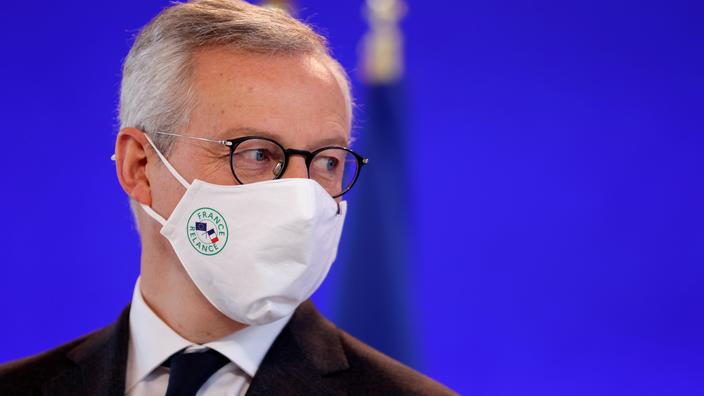It's a complicated equation, which has focused the attention of Bercy brains for several months: how, in a particularly uncertain context, to push the French to spend their money in spite of everything to relaunch activity and prevent a vicious circle from happening. settles down?
Taxation of savings, boost to demand, lower taxation… Each player has his own idea, in this debate essential to ensure a rebound in the French economy this year.
Read also: Bercy wants to transform the "Covid savings" of the French into a motor of recovery
According to Les Échos, one of the avenues on which the ministry is working would be an “
incentive system to make the French want to resort to transfers or donations between generations
”.
A way to increase exchanges, for example by simplifying donations, to strengthen consumption.
Asked, the minister's office does not confirm the information and refers to a speech by Bruno Le Maire, this Monday: "
my ambition is that there is the maximum amount of money to operate the French economy in 2021
», Declared the boss of Bercy during a press briefing.
The savings of the French must "
participate in this economic recovery on an obviously voluntary basis
" and "
incentives
" are being considered at the ministry, he said, without expanding on the subject.
The Minister also reiterated, during this point, that savings would not be taxed: this track is ruled out "
clearly and definitively
", hammered Bruno Le Maire, recognition that transforming this savings into expenditure would be one of the "
challenges
" of this year.
On the left, some voices called for taxing the savings accumulated by the wealthiest households.
A proposal that echoes an amendment tabled by Socialist deputies last year: its authors called for "
mobilizing the solidarity of the wealthiest households to co-finance the exceptional effort of the State
" against the epidemic.
Concretely, an “
exceptional solidarity levy
” of 0.5% would have been introduced on outstanding life insurance exceeding 30,000 euros.
The proposal was, however, rejected during parliamentary debates.
Household concerns about the future
This problem has been mentioned for a long time by the executive, anxious to put the woolen socks of households to contribution for the recovery: mid-April, a month after the introduction of confinement, Bruno Le Maire already warned that "
savings precautionary measure that is being built today [...] will not be released overnight.
It is likely that consumers will have wait-and-see behavior and that it will therefore be necessary to encourage demand,
”he said to the National Assembly.
However, "
the best way to protect yourself today [...] is to consume in the French economy, to restart our economy
", he added a few months later, in September.
But here it is: the French remain cautious about spending the some 130 billion euros set aside in 2020, according to figures from the Banque de France.
In January, the net inflows of the livret A and the LDDS increased again to 7.19 billion euros, 2.5 billion more than the two previous years over the same period.
And this, while the year 2020 had already ended at record levels.
INSEE noted, at the end of February, a “
sharp increase in the household savings rate
” last year, jumping 6.4 percentage points, from 14.9% in 2019 to 21.3% in 2020. The all in a context where household morale remains gloomy and their concerns about the future strong.
This real ant behavior is more noticeable among the wealthiest households, according to the Economic Analysis Council: “
the least affluent households […] have experienced a slightly negative trend in their levels of gross savings […] the most well-off, in particular, even though they suffered from the drop in stock prices at the start of the crisis, tended to save more than in normal times
, ”analyzed the institution's experts in a note published in January.
Hence the idea, put forward by some, of making these wealthier households, less penalized by the crisis, contribute more.
A solution rejected so far by the executive, which refuses any tax increase.
The heart of the problem remains confidence: the savings are there, but households are not ready to use it until the crisis is behind us.
But too much caution risks damaging consumption, worsening the economic situation.
Quite a dilemma.

